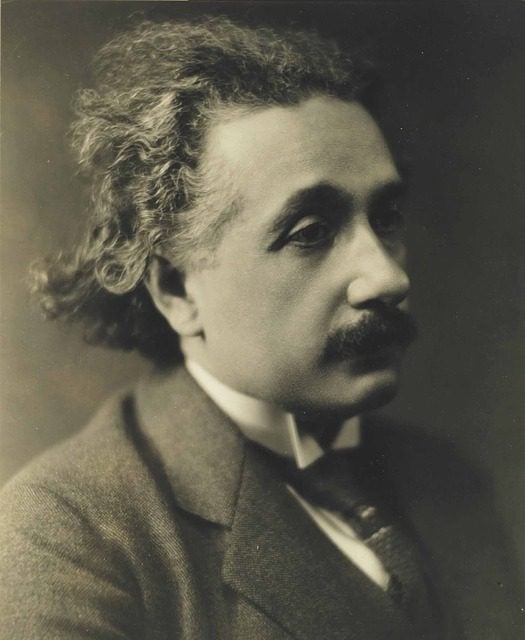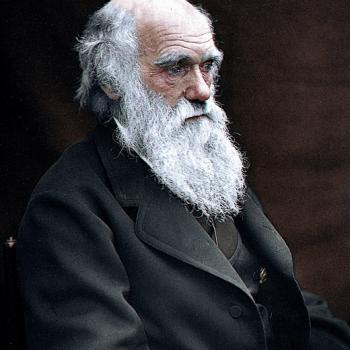
This is a follow-up dialogue and discussion of my paper, Catholics & Origins: Irreducible Complexity or Theistic Evolution? VicqRuiz is a self-described deist who has been a very congenial dialogue / sparring partner for some time now on my blog. His words will be in blue. My position on evolution / creation issues has actually significantly shifted today (I love when that happens!), after listening to the podcast dialogue mentioned in the above paper.
*****
Suppose that a creator built a perfect 1/12 scale model of Victorian London using Legos. Every business, church, and home in exact detail. Every curb and gaslight, every mail box and trash bin.
Now suppose that another creator built just a single Lego. One that could replicate itself, and in such a way that each replicated piece would differ from its parent in just such a way as to be located and shaped so that all the replicated pieces would form the exact same model of London.
Which of the two do you think would be the more impressive, the more praiseworthy work of creation?
If I believed that science had satisfactorily explained the mechanism of evolution: really explained it, as opposed to all the mind games and foolish rationalizations routinely made in almost blind faith, I would say that evolution creating everything (i.e., strictly by evolutionary natural / purely materialistic laws would be the more plausible option.
But because I don’t believe that to be the case at all, I think that Intelligent Design is necessary as a “supplement” so to speak. I refuse to accept a purported “scientific” view that can’t pass muster according to those same rules of science (that it has irrationally given God-like qualities). Materialistic evolution by itself simply can’t explain the origin of either fundamental building-block structures or higher biological structures and organisms.
I was trying to posit a long-term development of life in which God is tweaking genes over the thousands of millennia to produce all the forms of past and present living things.
Because it seems to me that if mutation and natural selection are completely false hypotheses, then in fact God is specifically creating every species that has ever existed, including such apparent dead ends as Hallucigenia, T.rex, and Homo habilis.
I only know that science hasn’t adequately explained the processes, and that a Designer is needed for it to be possible at all. The great philosopher David Hume (yes, you read that right) and Albert Einstein basically argued the same (Hume literally and Einstein in a more vague, pantheistic sense). In other words, it might be very broadly construed as a form of the teleological (design) argument: one of the “classic” theistic proofs.
I think that is the gist of what Dr. Behe is saying:
1. Admit that science cannot explain everything, and has not explained the mechanism and exact process of evolutionary change.
2. Admit that it is not absolutely impermissible to dare to mention God as a necessary Designer of natural phenomena that are irreducibly complex. This was common practice before Darwin, and Darwin himself did not exclude God from all consideration with regard to evolution (as I have documented elsewhere). In fact, he was a theist when he wrote Origin of Species.
Your (1) – I don’t have any problem at all admitting that.
Your (2) – It seems to me that the millions of false starts and dead ends, in the history of life from (now – 1 billion) to now, argue at least for a whole lot of randomness if not complete randomness. So if lots of randomness, why not total randomness, at least after the first deistic “winding of the key”.
It seems peculiar that God would create and destroy all those non-sentient species over all that time before finally getting around to the one species made in his own image. Certainly the designer would have put as much effort into such a beautifully engineered package as Velociraptor as he did into the bacterial flagellum – why did he let the former go?
Unless perhaps he was planning for some humans to become “paleontologists” and did not want them sitting around bored stiff for lack of anything to do :-)
Because such randomness cannot explain the history of biological life and the wondrous diversity therein. If you concede that science (i.e., evolutionary biology) “has not explained the mechanism and exact process of evolutionary change” (as you just did), then how is it that you choose to believe with blind faith that these processes happened by purely natural and random processes anyway? You have no clue how or why, but you believe it. That’s blind faith; the classic sociological “true believer”.
I think it is far more rational and consistent to admit that a Designer had some hand in it, or to remain utterly agnostic as to the whole thing. As a deist, you believe that God wound up the clock at the beginning. That’s already vastly different from the dominant pure materialism of today’s science. And it is at least some ground where we can meet and hold some premises in common.
As to the speculation of what God should and shouldn’t have done (a la S. J. Gould), I think (always have) that it’s just plain silly. If God exists and is omnipotent and omniscient, we would never in a million years figure out everything He does (let alone why He does it). Christians believe that many things are revealed in revelation (so that we can know those to the extent of our limited abilities), but the processes and details of creation are not included in that.
Fair enough, see you next time round.
And here I thought the discussion was just starting and getting really interesting and constructive. :-) :-)
Well, I know what we agree on, and I’m okay with what we don’t agree on……
*****
After the above exchange (which I have now edited slightly in my portion because of my change of mind), I listened to the friendly dialogue between Dr. Michae Behe and Dr. Stacy Trasancos (both Catholics). I still agree with Dr. Behe, but I didn’t feel that the two positions were all that far apart. In particular, Dr. Behe stated that Intelligent Design (ID) did not necessarily require additional “intervention” by God after His initial act of creation. I found that interesting because I had thought that ID required that.
All Christians, it seems to me (who believe in the inspiration of revelation: the Bible), have to believe that 1) God created (Genesis, etc.), and 2) that God in some sense “sustains” or “upholds” His creation, according to Hebrews 1:3 (“upholding the universe by his word of power”: RSV) and Acts 17:28 (“In him we live and move and have our being”).
I think this hypothesis of Intelligent Design (better understood by myself now) is more or less compatible with how Einstein described his own views (the main difference being that he was a pantheist, whereas I am a theist, and believe that a theistic God was the Designer). But the common ground is the belief in a non-material or immaterial force or power or spirit, if you will, that profoundly influences the material universe and its creative processes, and which itself seems ultimately beyond purely scientific or empirical analysis (precisely because it is non-material). Einstein expressed it in several interesting ways:
[for all sources, see my paper, Albert Einstein’s “Cosmic Religion”: In His Own Words]
My comprehension of God comes from the deeply felt conviction of a superior intelligence that reveals itself in the knowable world. (1923)
Try and penetrate with our limited means the secrets of nature and you will find that, behind all the discernible concatenations, there remains something subtle, intangible and inexplicable. Veneration for this force beyond anything that we can comprehend is my religion. To that extent I am, in point of fact, religious. (1927)
My religiosity consists of a humble admiration of the infinitely superior spirit that reveals itself in the little that we can comprehend about the knowable world. That deeply emotional conviction of the presence of a superior reasoning power, which is revealed in the incomprehensible universe, forms my idea of God. (1927)
I’m not an atheist and I don’t think I can call myself a pantheist. We are in the position of a little child entering a huge library filled with books in many different languages. The child knows someone must have written those books. It does not know how. The child dimly suspects a mysterious order in the arrangement of the books but doesn’t know what it is. That, it seems to me, is the attitude of even the most intelligent human being toward God. We see a universe marvelously arranged and obeying certain laws, but only dimly understand these laws. Our limited minds cannot grasp the mysterious force that moves the constellations. (1930)
[E]veryone who is seriously involved in the pursuit of science becomes convinced that a spirit is manifest in the laws of the universe — a spirit vastly superior to that of man, and one in the face of which we with our modest powers must feel humble. In this way the pursuit of science leads to a religious feeling of a special sort, . . . (1936)
In view of such harmony in the cosmos which I, with my limited human mind, am able to recognize, there are yet people who say there is no God. But what makes me really angry is that they quote me for support of such views. (1941)
Enough for me the mystery of the eternity of life, and the inkling of the marvellous structure of reality, together with the single-hearted endeavour to comprehend a portion, be it ever so tiny, of the reason that manifests itself in nature. (1949)
My feeling is insofar religious as I am imbued with the consciousness of the insufficiency of the human mind to understand deeply the harmony of the Universe which we try to formulate as “laws of nature.” It is this consciousness and humility I miss in the Freethinker mentality. (1954)
Now, I would ask an atheist: whence comes Einstein’s “deeply felt conviction”? Is it a philosophical reason or the end result of a syllogism? He simply has it. It is an intuitive or instinctive feeling or “knowledge” or “sense of wonder at the incredible, mind-boggling marvels of the universe”. Atheists don’t possess this intuition, but my point is that it is not utterly implausible or unable to be held by even the most rigorous, “non-dogmatic” intellects, such as Einstein and David Hume. And the atheist has to account for that fact somehow, it seems to me.
But in this view, which can be synthesized with Intelligent Design (and is similar in many ways to theistic evolution), God designed or foreordained that complex structures would evolve, and life and consciousness, etc., by some unknown non-material, overarching, guiding principle that transcends science, or concerning which science can give us no clues or answers. He not only created scientific laws that work essentially on their own (hence can be observed and studied scientifically), but also “supervises” or ordains the entire “project”: though not in an interventionist or supernatural / miraculous way. The processes and potentialities were there from the beginning, as a manifestation of His omnipotence and omniscience. It’s just that some of them are supra-scientific.
Science never can and never will explain all of reality to us, including the natural world in all of its complexity. Einstein understood this and expressed it. He (of all people) was intellectually humble and insightful enough to grasp it. Dr Trasancos, in the podcast debate, expressed (among many other things) a view that she later described on my Facebook page as “because science is never complete, do not draw conclusions as if it were all done with discovery.”
Dr. Behe maintained that present-day science is understanding more and more every day about the complexity of very small building-block structures, and that these things are becoming more mysterious and less understood all the time. The more we learn, the more we understand that we don’t know or fully comprehend, and likely won’t figure all this out anytime soon, if ever. That’s not a conclusion of despair; it’s simply intellectual humility: an admission of our inherent limitations on many planes. The universe (so we hold in this view) comes from a Designer infinitely more intelligent than we are. To think that we can figure out every jot and tittle is sheer folly.
In an effort to tie all my newly adopted thinking together (and to form a suitable conclusion to this paper), I thought I’d consult Dr. Michael Behe’s 2007 book, The Edge of Evolution: The Search for the Limits of Darwinism, which I had in my personal library but had not yet read. He offers many helpful thoughts in an eight-page summary of sorts (pp. 228-235; line gaps mean a gap in the text):
Like it or not, a raft of important distinctions intervene between a conclusion of design and identification of a designer.
[I]f one wishes to be academically rigorous, one can’t leap directly from design to a transcendent God. To reach a transcendent God, other, nonscientific arguments have to be made — philosophical and theological arguments.
Here I’m content to “take ‘purposeful designer’ in a very broad sense.”
Darwin’s main contribution to science was to posit a mechanism for the unfolding of life that required no input from any intelligence — random variation and natural selection.
[T]he more science has discovered about the universe, the more deeply fine-tuning is seen to extend . . .
But the assumption that design unavoidably requires “interference” rests mostly on a lack of imagination. There’s no reason that the extended fine-tuning view I am presenting here necessarily requires active meddling with nature any more than the fine-tuning of theistic evolution does. One can think the universe is finely-tuned to any degree and still conceive that “the universe [originated] by a single creative act” and underwent “its natural development by laws implanted in it.” One simply has to envision that the agent who caused the universe was able to specify from the start not only laws, but much more.
[T]he designer took all necessary steps to ensure life. Those who worry about “interference” should relax. The purposeful design of life to any degree is easily compatible with the idea that, after its initiation, the universe unfolded exclusively by the intended playing out of natural laws. The purposeful design of life is also fully compatible with the idea of universal common descent, one important facet of Darwin’s theory. What the purposeful design of life is not compatible with, however, is Darwin’s proposed mechanism of evolution — random variation and natural selection — which sought to explain the development of life explicitly without recourse to guidance or planning by anyone or anything at any time.
I regard design as a completely scientific conclusion.
I count as “scientific” any conclusion that relies heavily and exclusively on detailed physical evidence, plus standard logic.
Reviewing [my book] Darwin’s Black Box in 1996 for Nature, University of Chicago evolutionary biologist Jerry Coyne wrote, “There is no doubt that the pathways described by Behe are dauntingly complex, and their evolution will be hard to unravel . . . We may forever be unable to envisage the first proto-pathways.” If anyone thought it was hard to unravel ten years ago, it’s far worse now.
Darwinism implicitly entails the strong, broad, basic claim that, given enough chances, random mutation and natural selection can build the sorts of complex machinery we see in the cell. Intelligent design implicitly entails an equally strong, broad, basic prediction that random mutation cannot do so.
***
Photo credit: janeb13 (uploaded on 1-29-16): Albert Einstein in 1921 [Pixabay / Pixabay License]
***












